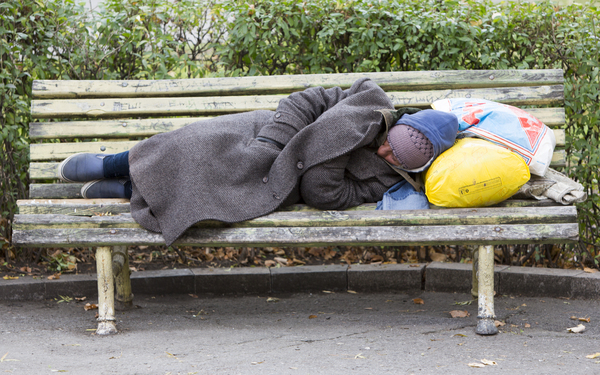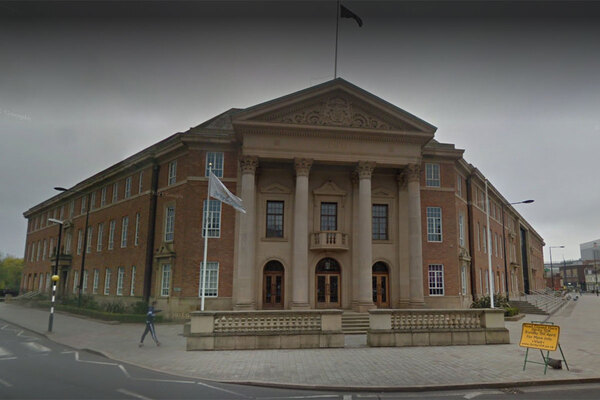The community taking on homelessness
Housing minister Gavin Barwell’s Croydon constituency has a homelessness crisis. Now members of the community are taking matters into their own hands to find a solution. Martin Hilditch reports
Video:
features style


It is the wrong side of midnight and the A&E department at Croydon University Hospital is a picture of well-lit gloom.
A handful of patients sit on plastic chairs, silently contemplating the dramas that have brought them here in the depths of the night. Their peace is broken by the entry of a small group of men and women, all wearing identical blue cagoules that proclaim their arrival from the European End Street Homelessness Campaign in big letters on the back. It has been a disappointing night for the volunteers so far. They have been charged with engaging with homeless people on the streets of Croydon as part of a massive project that is the first step of a campaign to end rough sleeping in the London borough.
Thus far, they have traipsed around parks, alleyways and lock-ups, shining torches into dark corners like Croydon’s answer to the Scooby-Doo gang. Despite visiting many of the borough’s well-known rough sleeping ‘hotspots’, after a couple of hours they have little to show for their efforts beyond tired legs. They have popped into the A&E department for a comfort break, but it is about to provide them with a depressing insight into the realities of life on the streets.
Video:
Ad slot
Major campaign
Moments after walking through the doors, the group are approached by a young man with an amputated foot, who has come to A&E for treatment.
“I’m homeless,” he says. He is accompanied by a friend, who is also homeless, and has made his own trip to the hospital in recent weeks. “I had pneumonia,” he says. “I had three blood transfusions.”
“I was genuinely shocked by some of the data – really, really shocked. It should be a wakeup call to the citizens of Croydon.”
Lee Buss, director of operations, Evolve Housing + Support
They strike up a conversation with Deborah Ives, head of operations at homelessness charity Evolve Housing + Support, who is leading the team tonight. Elsewhere, a young woman who says she was homeless up until a couple of weeks ago approaches and has a chat with one of the volunteers, Mary Blamires. She is concerned society tends to think all homeless people are alcoholics. “She said: ‘I just wanted to let you know we are not’,” Ms Blamires reports afterwards.
It is all a powerful reminder that when housing professionals talk about the strain and cost that housing problems place on other services, or when homelessness professionals discuss tri-morbidity (the combination of mental and physical ill health and drug or alcohol misuse), this is the back story. To put it another way, if you are looking to find rough sleepers, an A&E department in the middle of the night is a very good place to start.

The group is part of a bigger picture, however. Tonight, Croydon’s streets are covered with a patchwork quilt of volunteers. Their work is the start of the CR Zero 2020 campaign, which is led by Evolve, Crisis, Expert Link, Homeless Link and Thames Reach, to end rough sleeping in the borough. This sprang out of a wider European End Street Homelessness Campaign, which is being developed by the Building and Social Housing Foundation (BSHF) and FEANTSA, the European network of organisations working with homeless people.
The Croydon project’s ambition is clear. But what learning has it picked up already? And can it really succeed in eradicating rough sleeping?
Fast forward a few days, and some of the answers start to emerge. Over the course of the week, groups of volunteers speak to street homeless people in Croydon and get them to complete in-depth questionnaires. The aim is to build up the most detailed picture ever of the men and women living on the borough’s streets, which contain the eighth-highest number of people sleeping rough in the UK.
“People sleeping rough on our streets is probably the most visible indicator of the profound housing problems we have got in this country that it is my job to try to tackle.”
Gavin Barwell, MP for Croydon and housing minister
On a Saturday morning, just days after the last group of volunteers reports back, the information contained on the questionnaires has been analysed and the initial findings are to be presented to members of the Croydon community, including constituency MP and housing minister, Gavin Barwell.
The volunteers engaged with 64 homeless people over the course of the week (more than the 53 people recorded in the last street count); 42 of them completed a survey. Straight away, it is obvious the A&E department the volunteers visited earlier in the week has been a familiar destination for many of Croydon’s rough sleepers. In fact, half of the rough sleepers who completed a questionnaire had been in an A&E department in the past six months.
Collectively, there had been 53 attendances to A&E departments in that time, with 19 separate occasions in which people had been taken in by ambulance. There were a further 23 cases in which people had been in hospital as an in-patient.

Filling in a questionnaire
Grim events
The rest of the statistics make pretty grim reading, too. More than half of the respondents said they had been attacked or beaten up while on the streets. Weeks after this meeting, the Croydon Advertiser reported the story of a homeless man who has disappeared after a gang of “laughing thugs” attacked him in a doorway and set his belongings on fire.
And there are hundreds of other statistics, each with their own depressing back stories. Two of the six women who filled out forms were pregnant, 60% of the respondents had not been in permanent or sustainable housing for six months or more and 70% said there were no activities in their life that made them feel happy and fulfilled other than just surviving. Lee Buss, director of operations at Evolve Housing + Support, admits: “I was genuinely shocked by some of the data – really, really shocked. It should be a wakeup call to the citizens of Croydon.”
What of Mr Barwell, who says he has hotfooted it to the morning’s event “from my surgery, dealing with a number of housing issues”?
“We are asking the entire community to work together to find a solution to chronic rough sleeping on the streets of Croydon.”
Lee Buss, director of operations, Evolve Housing + Support
Croydon’s MP is certainly not shying away from the problem. “People sleeping rough on our streets is probably the most visible indicator of the profound housing problems we have got in this country that it is my job to try to tackle,” he tells the audience. He later adds: “I look forward to hearing what I can do, what the council can do and what the community can do to solve this great moral stain on our times.” He promises to resource any potential new responsibilities placed on councils as a result of the forthcoming Homelessness Reduction Bill.
The members of the Croydon community in attendance are not here to demand solutions from the housing minister, however. Instead, the aim is for local people, charities and businesses to take matters into their own hands.

Collective effort
“We are asking the entire community to work together to find a solution to chronic rough sleeping on the streets of Croydon,” Mr Buss explains. “Now we have the information, we need to do something with it. Croydon has the answers. I don’t mean Croydon the local authority – although they play a vital role. I mean us, everyone in this room.”
The next step is to form a “community solutions” focus group, whereby local people and organisations will work together to develop answers. This could involve asking existing services to work differently or developing new services or methods.
Only a few weeks later, Inside Housing drops in on the initial meeting of the group in a community centre. Members of local homelessness charities and drop-in centres have turned up, alongside local residents and council staff. Mark McPherson, director of strategy, partnership and innovation at Homeless Link and who is chairing, states that the purpose of the group is to “understand why people live on the streets”, “identify the things that stop them getting off the streets” and “find solutions”.
“It might be that we don’t get some of those people in the room… But we can come up with an ask for them.”
Mark McPherson, director of strategy, partnership and innovation, Homeless Link
The group begins by working in teams to identify points of contact and sources of help for homeless people in the borough. A chart of faith groups, night shelters and drop-in centres emerges. Over the next few weeks the information will be pulled together into a “systems map”. The next step will be to pinpoint barriers in the system and “who do we have to influence to remove them”.
“It might be that we don’t get some of those people in the room,” Mr McPherson says. “But we can come up with an ask for them.” He reminds the attendees that all solutions have to be “about housing” – “the solutions must mean they are no longer living on the streets”.
It is early days yet, but the mood in the room is optimistic. Rough sleeping might be on the rise nationally, but the group here today are determined they can reverse the trend and, indeed, eradicate it in Croydon by 2020. So far they have attracted more than 100 volunteers, had the ear of the housing minister and collected more detail about the borough’s homeless population than anyone before. They are likely to have plenty of learning to pass on to the housing sector – and do not bet against them achieving the seemingly impossible while they are at it.
Campaign origins
The work in Croydon to end homelessness can trace its roots back to the 100,000 Homes campaign in the USA.
This was a national grassroots movement working to find and permanently house 100,000 of the most vulnerable homeless people in the nation – with communities taking the lead. It won a World Habitat Award, organised by the Building and Social Housing Foundation (BSHF), in 2013.
David Ireland, director of the BSHF, says after the award win “there was a real interest in seeing if we could use some of the methods and adapt them into Europe”. This led to the birth of the European End Street Homelessness Campaign, co-ordinated by BSHF. Identical questionnaires have been filled out by homeless people in various cities, such as Barcelona and Valencia, and Croydon is the latest area to launch its own campaign.








